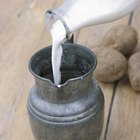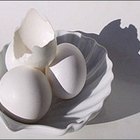peredniankina/iStock/GettyImages
The omelet is more than a versatile breakfast food. It is the go-to snack when there's nothing else to satisfy hunger. Omelets make a great quick meal whenever they are eaten. You can place just about anything in them, including two baking leaveners – baking soda and baking powder – to reach a fluffy texture. Carefully consider each before choosing, as baking powder and baking soda each have advantages and disadvantages.
Making Eggs Fluffy
In baking, you use baking soda and baking powder to make baked goods rise as they bake. They work the same way with egg omelets. The eggs puff up while cooking as the baking or baking powder reacts. Basically, they inflate much like a cake rises. These leaveners contain bicarbonate of soda, a chemical with a high pH that reacts to acidic foods with a low pH. Think of the reaction you get when vinegar mixes with baking soda for an erupting volcano. The eggs fluff like the foam "lava,” but in a more controlled manner. The result is a light, airy omelet.
The Browning Factor
The effects that baking soda and baking powder have on browning eggs is one of the places where the traits of the two leaveners diverge. Baking powder contains its own acid, so it can rise with no ill effects or mistaken measurements. Baking soda needs an acid added to it for it to react. If you fail to place enough acid to create a reaction, baking soda will brown the omelet prematurely. There's no worry of this occurring with baking powder.
Don't Add Too Much
Just a tad too much of baking soda or baking powder does affect the flavor of the omelet. Baking soda creates a soapy flavor, while baking powder makes the omelet bitter if you add too much. The leavener most likely to produce these ill effects is baking powder, because its acid is separately measured.
Fluffing Acids
The acids needed to activate the baking soda in your omelet may also affect it fluffiness. The acids include vinegar, lemon juice, sour cream, buttermilk and cream of tartar. Too much of a liquid or dry acid in the eggs can cause them to be too thin or too thick, upsetting the fluffiness. You must adjust your recipe to balance the liquid and dry ingredients to ensure that you reach the level of fluffiness desired in your omelet. For example, if you use buttermilk or sour cream in the omelet, reduce the amount of milk that the recipe calls for by the amount of the additional acid. Use baking powder if you don't want to mess with the recipe adjustments.
Related Articles

Nutrition in Meringue

Applesauce as an Egg Substitute for ...
How to Make Homemade Pancakes Without ...

Emergency Substitutions for Cream of ...

Why Is Sodium Aluminum Phosphate in ...

Does Adding an Extra Egg to Brownie Mix ...

What Can Be Used Instead of Eggs for ...

How to Keep Scalloped Potatoes From ...
Role of Xanthan Gum in Vegan Baking

How to Substitute Cornstarch for ...

How to Replace Eggs With Applesauce, ...

What Can You Use in Place of Egg Yolk ...

How to Freeze Egg Whites

What Is a Substitute for Potassium ...

Why Use Baking Powder in Pancake Batter?

Can Self Rising Flour Substitute for ...

How to Make Omelets With Baking Powder

What Happens When You Forget to Put ...

What Are the Causes of Pie & Pastry ...

What Are the Functions of Cream of ...
References
Writer Bio
Jonita Davis is freelance writer and marketing consultant. Her work has appeared in various print and online publications, including "The LaPorte County Herald Argus" and Work.com. Davis also authored the book, "Michigan City Marinas," which covers the history of the Michigan City Port Authority. Davis holds a bachelor's degree in English from Purdue University.